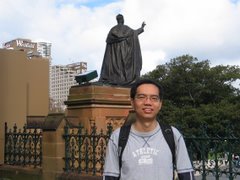Power and Leadership
POWERFUL is a good adjective. Leaders who are powerful are more likely than not to be effective. Leaders with too much power, unfortunately, are more often than not absolute in their actions with little concern of his advisers even his own true friends. They tend to turn agreed decisions on its ear, thus perceived to be abusive, self-centered, and high alone in the air. These leaders are only bound to plant seeds of hatred in the hearts of his own people who will eventually rid him of his self-accumulating excessive power.
Interestingly, the opposite situation could result in similar horrible outcome despite perhaps in a more subtle fashion. Given the same amount of power, a leader unwilling or unable to use his power is also doomed to be fruitless and engender unwanted split of power in pieces spread all over the place causing endless mayhem. These leaders are bound to plant seeds of distrust in the minds of his people. They are usually a convoluted type of person with reduced peace at sleep due to discreet conflicts of interest undisclosed to his people. Another "besotted" type is simply someone overly humble who tends to be submissive to the board in most areas of decision which would otherwise be just within the given circle of power that he unnecessarily, or worse, unconsciously gives up in the name of democracy or "votes in majority".
Power tends to corrupt and absolute power corrupts absolutely, shoots the pungent Lord Acton in his dictum to the Roman Catholic Bishop Mandell Creighton in 1887. But power that is unused and squandered tends to create a weak leader. And weak leadership is nearly equivalent to no leadership at all. And no leadership brings complete chaos in the society.
Your mission, Jim, should you decide to accept it, is to strike a reasonable balance between too much & too little in each role that you assume in your "society". Oh no, this is of course not the self-destroying recording machine that assigns our cherished Mission Impossible team their next mission. But the challenging mission remains ours. Yours and mine. (EJ)



